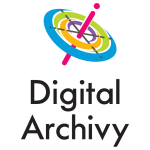Digital Archiving
Digital Archivy n. ~ is a digital archiving and information management services firm. We are dedicated to improving awareness of digital archiving. In addition, we develop strategies and plans by focusing on intellectual control, security, long-term preservation, and access to digital assets. We help clients identify and develop cost-effective solutions. And we use best practice to implement better workflows in digital archiving for institutions and individuals.
Archivy n. ~ The discipline of archives.
Digital adj. ~ Signals or data expressed as a series of the digits 0 and 1. In retrospect, this definition is best. “Digital creates value at the new frontiers of the business world, creates value in the processes that execute a vision of user experiences, and builds foundational capabilities to support the entire structure.” (McKinsey Insights, “What Digital Really Means, 2015)
Digital Archivy is more than a business, it’s a platform, mindset and method for strategic problem-solving. We specialize in digital archiving and active information management. We help clients identify challenges, evaluate answers, and implement and deliver cost-effective and efficient solutions.
Understanding Digital Archiving
For clients to understand their unique problems and requirements, we often have candid conversations. We help guide them by using our subject matter expertise. Also, we draw from and apply solutions based on best practice. We evaluate the big challenges and then tailor solutions. In addition, we deliver significant results. We communicate common sense answers and develop cost-effective solutions. In addition, we also build quality control and quality assurance into everything we do.
As a result, we have a track record of helping institutions determine better ways to make use of their assets. We have learned from experience that accurate and consistent metadata adds value and enhances the utility and potential of large datasets. With this in mind, the subject matter experts (SMEs) at Digital Archivy help clients re-contextualize and re-interpret their information and assets.
For a complete list of clients with whom we have worked, please see our Clients List.
Successful Digitization
 Our ability to identify risks and challenges related to successful digitization projects is built on a familiarity with archival practices. In addition, it also draws from our experience managing digital collections. We have learned, for example, that short-term solutions may not provide the best long-term benefits.
Our ability to identify risks and challenges related to successful digitization projects is built on a familiarity with archival practices. In addition, it also draws from our experience managing digital collections. We have learned, for example, that short-term solutions may not provide the best long-term benefits.
Digitization Projects
Every project benefits from collaboration between stakeholders familiar with collections, procedures, network architecture, and mission. By drawing on this internal knowledge, a multi-step phased approach can be implemented so digitization projects are successful, an appropriate content management system is selected and installed, and efficient processes and workflows can be established. These steps include:
- creating effective use cases
- determining technical specifications
- outlining functional requirements
- working with IT and Legal Counsel to recognize information security requirements.
To be useful, digital assets must be captured uncompressed and at high-resolution, arranged and described accurately and consistently, managed reliably and made accessible to end-users. Decisions made in today’s technological infrastructure, however, may need to be revisited.
Successful Digitization Programs
There are many points to consider to mitigate risk while preparing for a mass digitization project. For example:
- Digital surrogates are a representation, but not a replacement for originals.
- Mass digitization may increase an institution’s exposure to loss of control and risk of unlicensed or accidental usage.
- Digitization does not necessarily make documents text-searchable.
- Metadata describes and simplifies finding assets, and embedded metadata embedded in files offers protection against unauthorized usage or access.
- Access is not preservation, though it can serve many functions.
- Many of yesterday’s and today’s file formats are at risk of format obsolescence.
- Archival masters must accommodate future migrations and technological innovations.
- Failure rates of magnetic and optical storage media increase significantly over time.
In an ideal world, institutions would create digital masters from hard copy and analog sources. This would enable them to provide immediate access to digital assets, and preserve digital resources in stable formats forever. However, formats evolve and technologies change. As a result, technical requirements, standards, and goals change. And there are significant risks and high-costs associated with mass digitization.
Lessons on Success
We have learned that any strategy, good or bad, will provide measurable results. However, it may not offer scalable solutions. Without a practical plan it is difficult to addressing clearly-defined use cases and functional requirements. Further, institutions may not benefit directly from a mass digitization project. In fact, many institutions recognize that projects fail and many turn out to be be a waste. If you are pragmatic and realistic, you can create a strategy with well-defined and effective solutions. Also you can implement a plan to ensure that your digital content add value, context, and meaning to the institution itself.
For a complete list of clients with whom we have worked, please see our Clients List.


